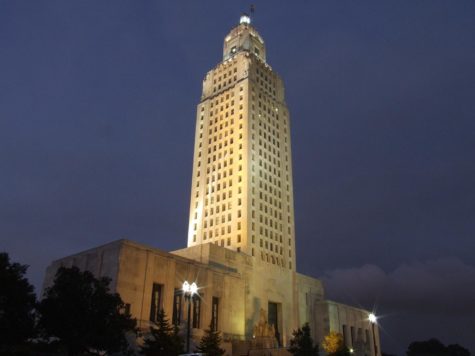
On June 20, Gov. Jeff Landry signed a law requiring public schools in Louisiana to display posters of the Ten Commandments in classrooms.
From elementary to post-secondary schools, all Louisiana public schools must display a poster similar to the “plainly constitutional” ones revealed by Landry and Attorney General Liz Murrill on Aug. 5.
The duo revealed at least five different ideas for posters, including one titled “The House of Representatives and the Lawgivers,” featuring the Ten Commandments between a stone carving of “Moses the Lawgiver” and a photo of House Speaker Mike Johnson from Louisiana.
Another poster features former Justice Ruth Bader Ginsburg next to historical documents such as the 1689 English Bill of Rights and the Declaration of Independence, as well as a quote from a school paper that she wrote about the United Nations Charter when she was 13.
Other potential posters include images and quotes from Rev. Martin Luther King Jr., playwright and actor Lin-Manuel Miranda and former Supreme Court Chief Justice John Marshall.
Ginsburg’s granddaughter, Clara Spera, wrote an email to Rolling Stone Magazine regarding Ginsburg’s misquotation on the posters. “The use of my grandmother’s image in Louisiana’s unconstitutional effort to display the Ten Commandments in public schools is misleading and an affront to her well-documented First Amendment jurisprudence,” she said.
The posters served to “illustrate that there are constitutional ways to apply this law,” Murrill said.
There is some legal precedent to the Louisiana law. In the 1980 case of Stone v. Graham, the U.S. Supreme Court struck down a similar law in Kentucky. However, the 2005 Supreme Court case Van Orden v. Pary ruled that a monument of the Ten Commandments could be placed in a public park.
While the bill passed easily through a Republican-controlled House, Senate and executive branch, the court immediately challenged the law. A coalition of groups filed a lawsuit, including the American Civil Liberties Union, Americans United for the Separation of Church and State and nine Louisiana families of different religious backgrounds. Within the nine families are four members of the clergy.
“Permanently posting the Ten Commandments in every Louisiana public-school classroom — rendering them unavoidable — unconstitutionally pressures students into religious observance, veneration, and adoption of the state’s favored religious scripture,” the suit said.
“I think it’s a ridiculous invasion of religious and state crossover,” State Rep. Aimee Freeman, who represents Tulane’s district, said. “This country was founded on religious freedom, and I think it’s insulting and illegal.” Freeman voted against the bill.
Some Louisiana public schools that are defendants in the lawsuit will not have to post the Ten Commandments until at least Nov. 15, due to an agreement between the state and the federal court.
“Tell the child not to look at it,” Landry said at a news conference on Aug. 5. “Really and truly, I don’t see what the big fuss is about.”



